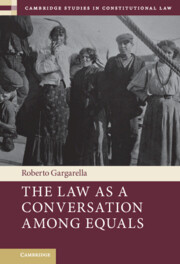In A Cosmopolitan Legal Order: Kant, Constitutional Justice and the European Convention on Human Rights, Alec Stone Sweet and Clare Ryan reconstruct Kant’s legal philosophy as a program of cosmopolitan legal order (CLO). A CLO is defined as a multi-level, judicialized, transnational system of rights protection that confers on all persons, by virtue of their humanity, the entitlement to challenge the rights-regarding decisions of public officials, who are under an obligation to assure the equal juridical status of all. The authors illustrate this claim with respect to the development of the ECtHR and the Court of Justice of the European Union. While generally agreeing with their argument, I claim that they minimize the republican aspects of Kant’s political philosophy in favour of strong judicial review. After outlining republican and democratic objections, I claim that their book illustrates a model that I call ‘dialogic constitutionalism’. Dialogic constitutionalism does not neglect legislative authority, but places it in a conversation with judicial authority, whether domestic or transnational; such conversations can serve to upgrade standards of rights protection over time and are not frozen precommitments. Constitutions also have a representative function of standing for the intergenerational continuity of the people, whereas legislatures are bound by electoral cycles.
